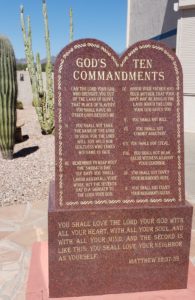Homily: The Ten Commandments Preaching Series. “Thou Shalt Not Steal.”
We continue our series with a look at Commandment #7. Next week in Holy Week, We have Commandments #3 and #5 to preach, to complete our look at all ten.
I was visiting a Tucson (AZ) diocese church, just a month ago, which had this (< photo) beautiful, commissioned, art work to
 greet Mass-goers at the church entrance. I told the pastor how our parish was covering the 10 Commandments as a Lenten theme, and wouldn’t that rock-tablet art work look better now at our own front entrance!? He responded, (teasingly–that I would steal it away for our parish)—“Well, do read what is written there next to the Latin numeral VII, before you get any ideas of sneaking it away in the night! “Plus,” he said, “the monument is bolted into the concrete quite strongly.” ☺
greet Mass-goers at the church entrance. I told the pastor how our parish was covering the 10 Commandments as a Lenten theme, and wouldn’t that rock-tablet art work look better now at our own front entrance!? He responded, (teasingly–that I would steal it away for our parish)—“Well, do read what is written there next to the Latin numeral VII, before you get any ideas of sneaking it away in the night! “Plus,” he said, “the monument is bolted into the concrete quite strongly.” ☺
Of course I am joking here about the temptation, but it is astonishing of what things people do covet and will take for themselves in stealing, with an “unmitigated gall” in doing it, too! I googled “crazy theft stories” and got one about a man whose laptop was stolen by a person on board a jet flight with him, by the passenger in the row behind him. Yep, ‘crazy! https://angelinatravels.boardingarea.com/2016/12/01/craziest-theft-story-happened-best-friend-delta-flight-yesterday/
Speaking of religious statues or art works, I once saw a magestic13-foot-tall cast bronze sculpture of Moses, standing at the Crystal Cathedral, now Christ Cathedral, in Garden Grove, California. I do remember being told that the real rocks at its statue base were transported in from Mt. Sinai. ‘Cool! The work of art was done by an Arizonan sculptor named John Soderberg. To me it shouted out: “Freedom! Deliverance! God’s Moral Guide for humankind!” As we continue this Commandments series, we keep to that perspective of God as giving the Law to aid in our freedom, and not of His trying to constrict us. The freedom message of the 7th commandment is that we don’t have to be a slave of this sin anymore, we can have a perspective of the world’s betterment if we had no worries of stealing going on.
When Moses goes down with the Decalogue to the people (last Thursday’s daily Mass reading of Exodus), he had three Commandments pertaining to the vertical relationship of people to God, and seven Commandments pertaining to the horizontal relationship of people to people. The 7th Commandment uniquely addressed of how people are called to respect how we are each given our place and things as all under God, while seeing ourselves as all sharing a world given to us from God above, Who meant for us to work in love and unity. The world’s sad history, since Cain said “Am I my brother’s keeper?” has been the shame of people mostly interested in taking, rather than giving, in conquering rather than working as one, and in fighting for control over things rather than have fair distribution. We are called to love our neighbor as ourselves, as by our realizing it is done so by fair communal, shared experiences. The problem is that, all too often, we are not fair. We forget how we will all be held to account of what we did fairly or selfishly and greedily in this life. Morality matters. One quarter of the Catechism does cover it!
Where does stealing or theft originate? Jesus explained it: “Theft is one of many acts that come from the heart and defile a person.” It’s in Matthew 19.
Stealing can be for wrong attention. I still recall ones that happened in my school social settings, in the mix of people. Let’s see if you can relate to them. The more obvious ones were of when people would steal homework, steal answers off another’s page, plagiarize work, or sneak hidden answers into testing periods so to steal an undeserved “A” grade. Students also can be petty and cruel sometimes, looking to steal good attention away from someone. They’d try to dominate in relational or social matters, like it was a competition. It led to some unpleasant memories for me like one of a person trying over and over to sabotage the communication I was trying to have with another person, with whom a friendship was naturally developing. But that other person was very jealous for that other person’s attention, and they would try to manipulate things against me, all pretending it was well and good. It was sin versus the 7th Commandment. The hard work of this sin is the constant pretending that you’re not some type of crook.
Inter-personal communications and media communications has a whole category of stealing. You can steal attention away from the Truth, and dominate with a lying traffic of deception. There are many ways to deceive today on the good trust of others; the crimes on the internet and in finance and business are legion. When they were writing the New Catechism of the Catholic Church, one moral teacher said: ‘The new ways to steal keep on increasing, so that we can’t keep up in our morality lessons. Some stealing crimes now are the ones you don’t even know happened to you, until it’s noticed way too late, and you’ve been cleaned out!”
The Do Not Steal Law of God is a most understandably good and obvious law to us when we have been the one trespassed upon by another in some way like this. I wonder, as in a congregation like this, what were the worst thefts people have experienced? Maybe you entered a property of yours that had been ransacked by thieves. How surprised and violated and unsafe did it have you feel? How did you deal with the loss? My nephew moved from Carolina to Maryland a few months ago, and the rental truck with all his things in it was stolen away, truck and all, right in front of my brother’s house! One of my close priest friends had his new car stolen at the Basilica Shrine, during one of his Masses there! He never saw it again.
In my last parish, we had security problems, with outsiders stealing church property—purses in pews, the whole sound system in an unlocked church, copper from the ac units, and once an attempt to break open the safe in the rectory. As for insider problems in parishes, I’ve had money stolen, done by a ruse, making me feel really used. We didn’t prove it, but I think it was by parishioners who hired the thief. I’ve had to let go and move on after that. In three parishes I have served, there was insider stealing—meaning it was done by a lay member. Go figure! That did show me how the fear of God was not in them, of people of my own flock, but then, I have been scandalized a few hundred ways within the Church by laity and clergy. It reminds me how the devil (the Thief) is at work to trip us all up. Plus, Jesus told us there’d be wolves in sheep clothing among us, too. Yet I need to keep calling parish people to honesty and repentance before God, right from this pulpit. I also have to better realize how stealing is a serious weakness in some people, with their shattered loss of regard for what they do unto others and to their self.
I purposely mention a few crimes done with association to a church, so to then make this point about stealing. Yes, it is outrageous how people would steal from or within a house of God; however; all thefts, small or large, are thefts versus God. God owns all things. We are all borrowing from Him the things that we think are ours, with some temporary ownership, or property rights on earth, but truly—all is on loan from God. Stealing is a daring act before God, for He always sees it. Stealing is a sin even if one is not caught doing it; some think it’s only sinful if one’s caught. How dumb. This shows how denial of another’s care is usually hiding in every theft. In all stealing, someone gets hurt, someone loses.
The inspiration for this Ten Commandments series was the lower participation in the Sacrament of Reconciliation. I think as with the 7th Commandment, a practice of denial is keeping numbers of people away. Deniability and a lack of accountability or responsibility are their sins of omission. With stealing there often is lying; that, when one is found out, or under suspicion. People take things as if they were entitled to them. Entitlement leads to all kinds of sinning. People are carrying about in these ‘hidden’ sins, but they need the freedom that Confession affords them to get back to honest living and to being givers, not takers!
A reasonable reason to deny one IS stealing could maybe only be made of the unjustly, neglected people of society who are in great poverty. A pastor last week told me how he caught some very poor-off family near the district with their stealing things, and he just said to them: “Tell me what you need, and I will help you get it. I will try to help you not to resort to that.” That was a matter of “distributive justice,” one of several like categories pertaining to the Seventh Commandment, but we don’t have room here to cover them. Property rights are another category of this Commandment. Private land, personal property, and the rights that go with it are part of the freedom that the 7th Commandment covers. In societies trying for laws and justice and freedom, it is an increasing problem of people using the system’s trust. In recent times, my high school alum friend had his prized Camaro stolen away at gunpoint at a Metro garage, in broad daylight. Wow. The person from the district that took it makes stealing a daily activity for them. Sad! It describes life in many places in the world.
Some ways of governing do just the opposite of providing freedom and the first benefit of trust and cooperation; instead, they dictate all the terms and control all the power in society, so that true freedom is never afforded to people, not ever to it easily be abused. The awful cost of it is the stealing of everyman’s freedom away.
In the worse categories of stealing, one might think of the big heists in history, such as the 2020 one in Germany that went on in Dresden at the Green Vault Museum collection, where 100 priceless treasures and jewels worth up to a billion dollars were stolen. Those are the big time stealers of the world, unfortunately to be later glamourized in a hit movie or book. A worse crime though would be one against another human being in stealing their innocence, as in rape, child abuse, incest, and such acts—as, while jewels can be recovered, a person’s innocence stolen away cannot, leaving them hurt for life. That offense cries up to Heaven!
These are heinous thefts and steals to be going on every day, some of which the perpetrators may never be punished on earth. For that, God says that these people will pay before the Almighty. Romans 12:9 has God saying: “Vengeance is mine, I will repay them according to their works.” It’s a foolish thing to dare God His justice.
In the act of stealing, it is not just people that one can disrespect—one can disrespect God’s creation (and therefore, God). There is the taking away of beauty in creation or the lack of protecting it—that’s a sin. There is wrong done versus the planet, as in exploitive ways or grossly irresponsible acts or utterly selfish, only-for-the-now consumption. When we steal from the created world around us, we sin as not acting as the respectful stewards of God whom we have been called to be, but rather become reckless fools who could care little about it anything. Pope Francis has spent some attention on this matter.
It is a good place to wrap up a teaching on Commandment Seven by praising the practitioner of stewardship. Stewardship is a word for people belonging to God as their purposed living. Their witness is quite the opposite of those who would steal. Instead, these just persons are tithers or givers, like to the Church’s need or to where God directs them. As through this virus scare time, the parish will need her honest supporters to our needs. Someone asked me for a Bible verse to defend this “temple support.” I said: Malachi the prophet focused much of his writings on it, calling under-givers to the cause of Faith as “robbers.” (Mal.3:8,9.) Woah! The bible book is addressed not to outside pagans but to the house of believers who have members living ungenerously to God and to God’s obvious causes. Rooted in it is a lack of identity to God or just of a lack of gratitude, both of which can be conformed to God when admitted as an 7th Commandment offense (or combo of other Commandments’ offenses). The spiritual change of a person to stewardship or tithing can bring about the most contentment and depth to a person in their growth, affording them a freedom in The Lord. I have known many such free, contented persons in all my parishes. The Holy Orders’ calling to surrender into a stewardship of self (as the gift or tithe or total offer) makes for happy clergy, too. It’s meant to be of the same spirit. The religious orders of the Church even take a vow of poverty to this end for sharing everything, and owning nothing—all in the spirit of the early Church who began the practice (see Acts 2). It’s truly something to see the happiness of those people in such vows. They make good saints, too.
We can be glad we serve a God Who is good and generous to us. As today’s Psalm 130 says: “With the Lord is kindness and plenteous redemption. H will redeem Israel, looking to free her from all her iniquities.
Thus, I trust in the Lord, my soul trusts in His word. I wait upon Him like sentinels for the dawn. Lord, be attentive to my  prayer.
prayer.

